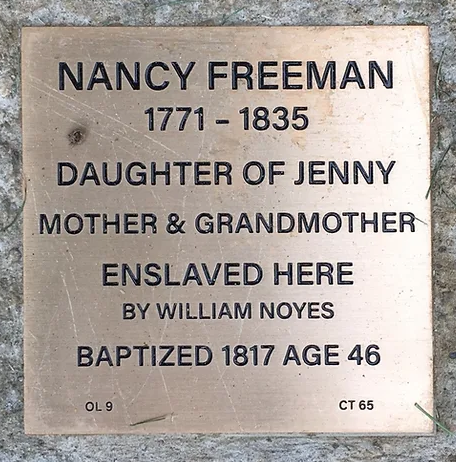 A list of those enslaved by William Noyes begins with Prince and Jenny, then tells us that Nancy, daugt of the above was born Nov. 11, 1771. Died Aug. 11, 1853. A gravestone in Duck River Cemetery confirms Nancy Freeman’s life dates. As a child she served alongside her four siblings in the Noyes house on the site of today’s Florence Griswold Museum. William Noyes Jr. recorded the births of my Negro boy called Jordan in 1787 and my Negro boy Harry in 1790. Both were likely Nancy’s children, born when she was 16 and 19. The boys’ father was likely Jordan Freeman, whom Nancy later married.
A list of those enslaved by William Noyes begins with Prince and Jenny, then tells us that Nancy, daugt of the above was born Nov. 11, 1771. Died Aug. 11, 1853. A gravestone in Duck River Cemetery confirms Nancy Freeman’s life dates. As a child she served alongside her four siblings in the Noyes house on the site of today’s Florence Griswold Museum. William Noyes Jr. recorded the births of my Negro boy called Jordan in 1787 and my Negro boy Harry in 1790. Both were likely Nancy’s children, born when she was 16 and 19. The boys’ father was likely Jordan Freeman, whom Nancy later married.
At some point she perhaps moved to the larger house that William Noyes built next door. Lyme’s vital records specify that she served him, rather than his son William Noyes Esq., when her third child was born: Biner Negro, Daughter of Nancy Servant of Willm Noyes was born on the 15th day of March AD 1793 as appears by certificate from Wm Noyes Esq. Where Nancy lived nineteen years later in 1812 when her fourth child was born is not known. Birth records state only that Isaac Freeman Son of Jordan & Nancy Freeman was born. An emancipation certificate has not been found, but by 1812 Nancy Freeman, age 41, was no longer enslaved.
Nancy Freeman returned to the Noyes household sometime before May 18, 1817, when church records state that Nancy negro servant of Mrs. Mary Ann Noyes was baptized. A notice in the Connecticut Gazette confirms that she had left her husband. Jordan Freeman of Lyme posted on December 31, 1817: Whereas my wife Nancy, has eloped from my bed and board: This is therefore to forbid all persons trusting or harbouring her on my account. Nancy was then 46 and a grandmother.
William Noyes’s widowed daughter-in-law Mary Ann Noyes made unusual provisions for her servants in 1819 when she wrote her will: To Prince and Nancy (Negroes who have for a number of years past resided in my family) as a compensation for Services which they have rendered me, I give and devise the Sum of One Thousand Dollars each, for their use and maintainance. A decade later in 1829, Lyme’s selectmen appointed an overseer to advise order & direct Nancy in the management of her business. The order states that because of “intemperance,” she was likely to spend her estate & be returned to want.
In 1830, at the height of the local temperance movement, a church committee charged Nancy, a woman of color, with great neglect of Christian duties and gross violation of covenant vows, caused by her frequent habit of being intoxicated, with spirituous liquors. Rev. Chester Colton urged her with feelings of kindness to turn from her evil ways, but when she persevere[d] in her ungodly course, church members resolved that she be cut off from all communion and contact.
Nancy Freeman lived during her later years across the road from the two houses in which she had been enslaved for almost four decades. The 1850 census lists her by name, age 78, in the household of William Noyes’s grandson Dr. Richard Noyes. Probate records show that when she died at age 82, she owned a dwelling house with a quarter acre of land valued at $280. She also had cash on hand of $108.83.


